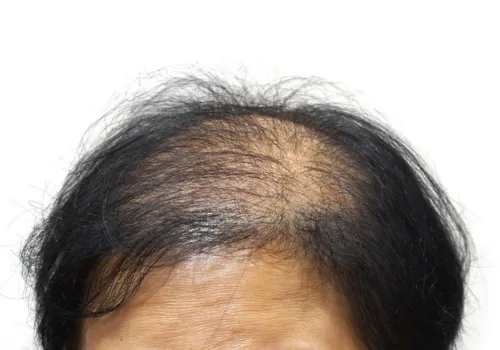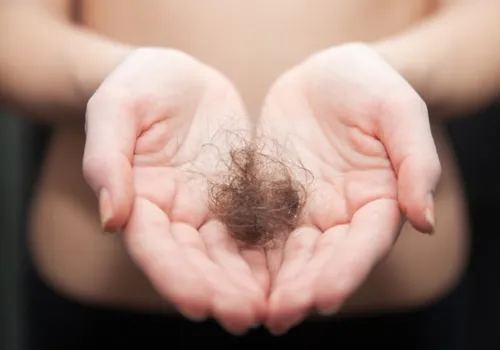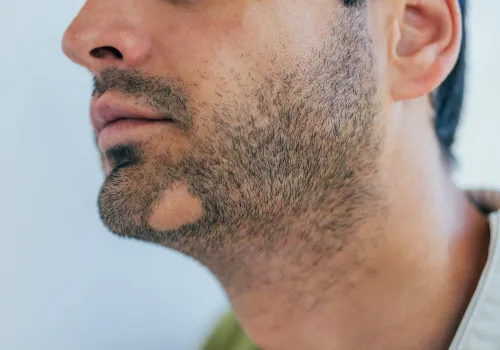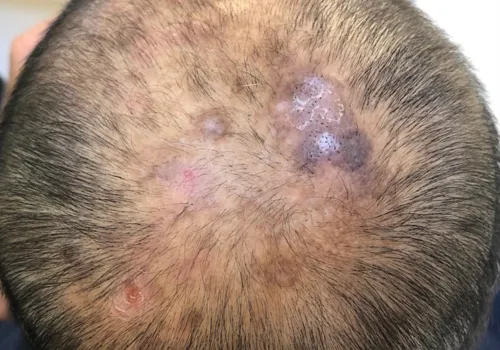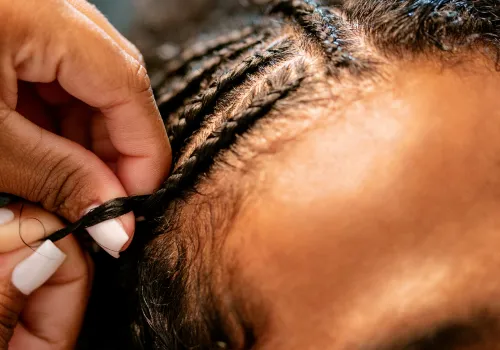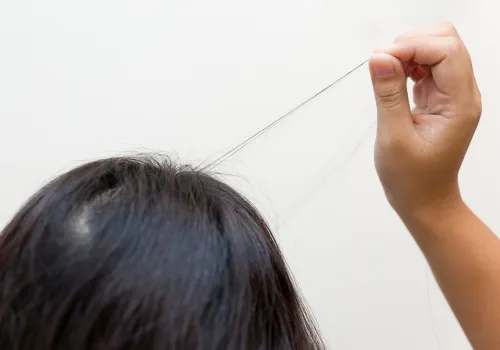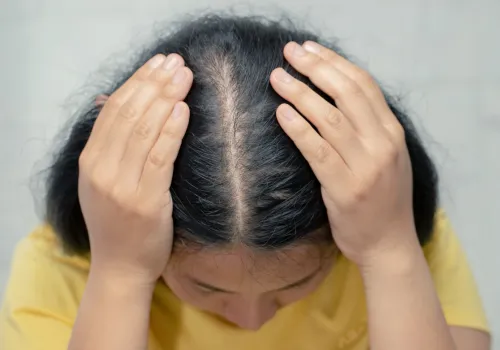
Alopecia Areata (AA)
(Autoimmune Hair Loss)
An autoimmune condition where the body attacks its own hair follicles, causing round patches of hair loss on the scalp or body. Severity can vary from small spots to complete hair loss (Alopecia Totalis or Universalis).
Scroll to Learn More
An autoimmune condition where the immune system attacks the hair follicles, causing sudden patchy hair loss.
What is Alopecia Areata?
Alopecia Areata is a non-scarring autoimmune condition in which the body’s immune system mistakenly targets hair follicles, disrupting the normal hair growth cycle and leading to sudden, round patches of hair loss on the scalp or other areas of the body.
In some cases, hair regrows on its own; in others, it can progress to more widespread loss (Alopecia Totalis or Universalis). The condition can come and go, and its severity varies widely. While not physically painful, it often carries a deep emotional toll and is closely linked to immune, gut, and stress-related imbalances.
Common Causes & Contributing Factors
Autoimmune dysfunction – Immune cells attack healthy hair follicles
Genetic predisposition – Often runs in families with other autoimmune diseases
Leaky gut or dysbiosis – Gut barrier disruption can fuel immune miscommunication
Chronic stress or trauma – High cortisol can modulate immune responses
Viral infections – Sometimes triggers or worsens episodes
Nutrient deficiencies – Especially vitamin D, zinc, and essential fatty acids
Environmental toxins – May contribute to immune system dysregulation
Don't worry, we can help!
How It’s Diagnosed
Diagnosis includes:
Clinical scalp and skin examination
Pull test and dermoscopy to examine follicle openings
Functional blood analysis to assess immune markers, thyroid antibodies, iron, vitamin D, and gut-liver axis
Food intolerance and gut barrier evaluations via bioscans or advanced labs
Medical history review for autoimmune links (e.g., Hashimoto’s, vitiligo, celiac)
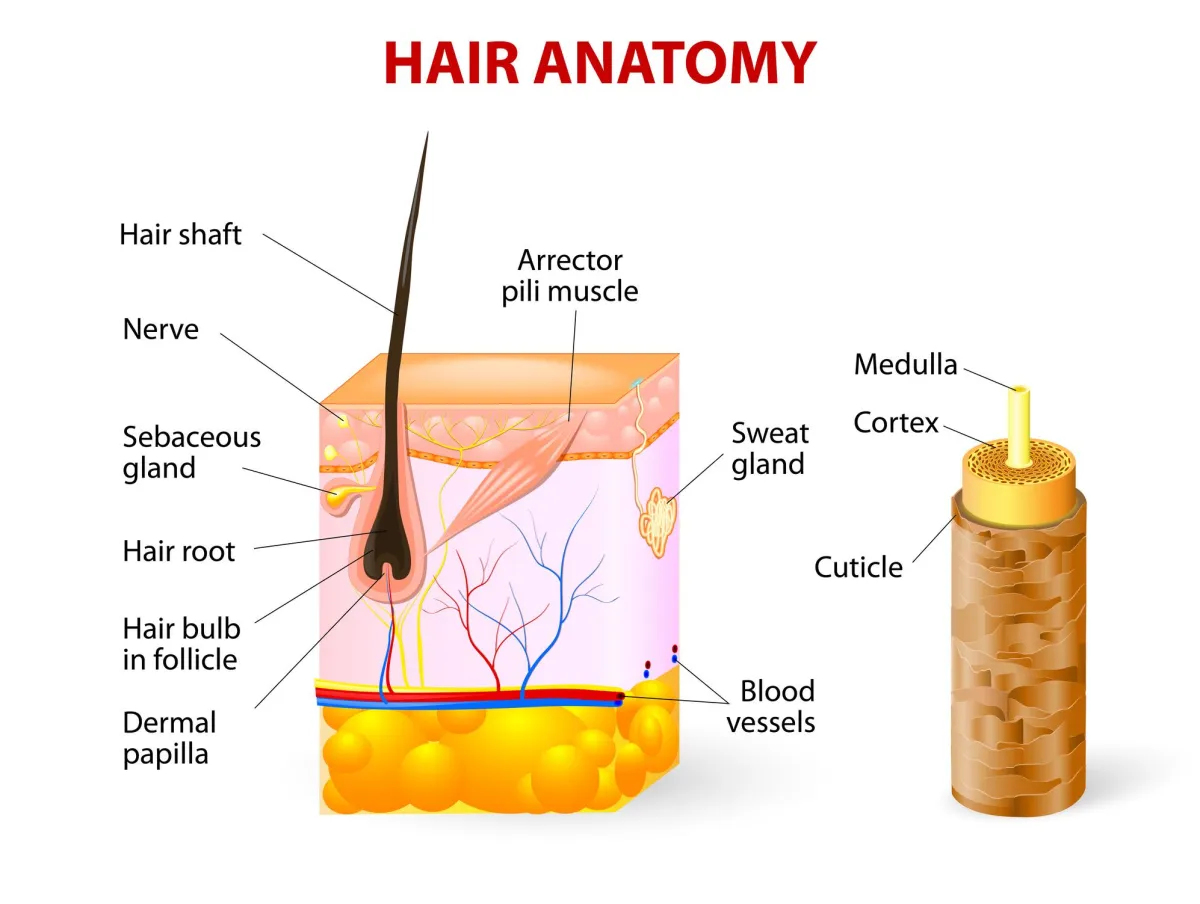
What You Might Notice
Sudden onset of round or oval bald patches (smooth, non-scaly)
Exclamation mark hairs (short, broken hairs at the border of patches)
Tingling or burning in the area before shedding
Nail pitting or ridges in some individuals
Loss of eyebrow, eyelash, or body hair in advanced cases
Treatment & Management Options
Lifestyle Recommendations
Adopt an anti-inflammatory diet (gluten-free, dairy-free, low sugar)
Support gut repair with bone broth, fermented foods, and digestive enzymes
Mind-body practices (EMDR, meditation, breathwork) to reduce stress burden
Topical / Clinical Treatments
Herbal-based anti-inflammatory serums (turmeric, rosemary, green tea extract)
Microneedling to trigger follicle stimulation
Red light or low-level laser therapy to reduce inflammation and promote growth
Avoid harsh steroid injections unless absolutely necessary
Scalp Therapies & Supplements
Functional supplements: Vitamin D3, zinc, omega-3, quercetin, and adaptogens
Gut-healing support: aloe vera, glutamine, activated charcoal (if needed)
Scalp detox (Iridium Green Shampoo) and Cell Food Drops for follicle nourishment
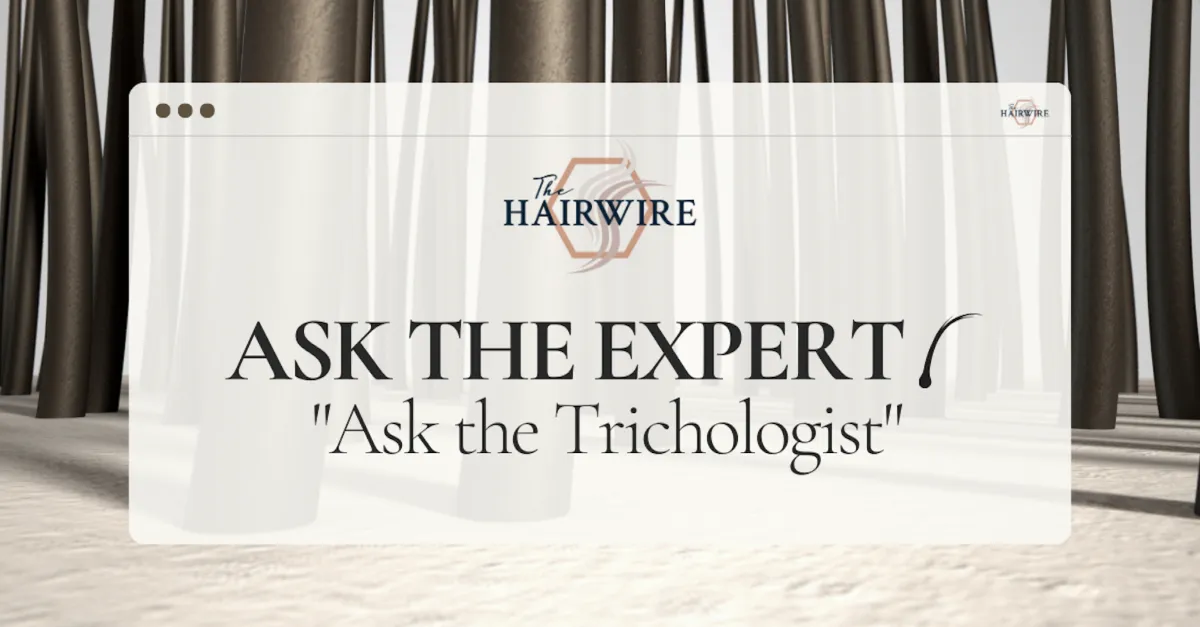

Not ready to book a session just yet?
That’s okay—your curiosity still matters! If you have a question about hair or scalp health but aren’t ready to move forward with a consultation, feel free to send it our way. We may feature it in an upcoming blog post or use it as a topic in a future live session—because chances are, someone else is wondering the same thing too.
Androgenetic Alopecia Blog
We regularly share content on this topic through both video and written posts. Use the search bar to find answers to the specific questions you're looking for.
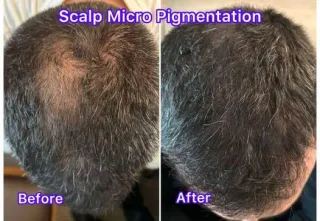
Scalp Micropigmentation (SMP)
Scalp Micropigmentation (SMP) ...more
Androgenetic Alopecia ,Bissan
May 22, 2025•5 min read

General Hair Loss Treatments
General Hair Loss Treatments ...more
Trichology ,kerrijarrett
May 22, 2025•1 min read
"I was devastated when my 7-year-old daughter developed bald patches. After working on her gut health and inflammation with Bissan’s guidance, her hair started coming back. It’s been a journey, but now we have hope."
– Parent of Client, Age 7
Real Stories. Real Experiences.
You’re Not Alone with Alopecia Areata
Alopecia Areata can be unpredictable, but you don’t have to face it alone. This community was built to support and uplift — real people with real experiences, just like yours. We’re here to listen, share, and grow together.
Want to Learn more on Alopecia Areata
We’ve curated a powerful playlist just for you — filled with expert insights, real stories, and the top videos you need to better understand Alopecia Areata. Whether you’re newly diagnosed or seeking support, knowledge is power.
Join our YouTube community and explore trusted content to guide your journey.
CLICK BELOW TO WATCH FIRST!
Are You a Hair & Scalp Professional? Join the Faculty of Trichology
Whether you're already an expert, just getting started, or looking to deepen your specialty—we’ve got something for you.
The Faculty of Trichology is where professionals come to elevate their skills, build their credibility, and connect with a network that takes hair and scalp health seriously.
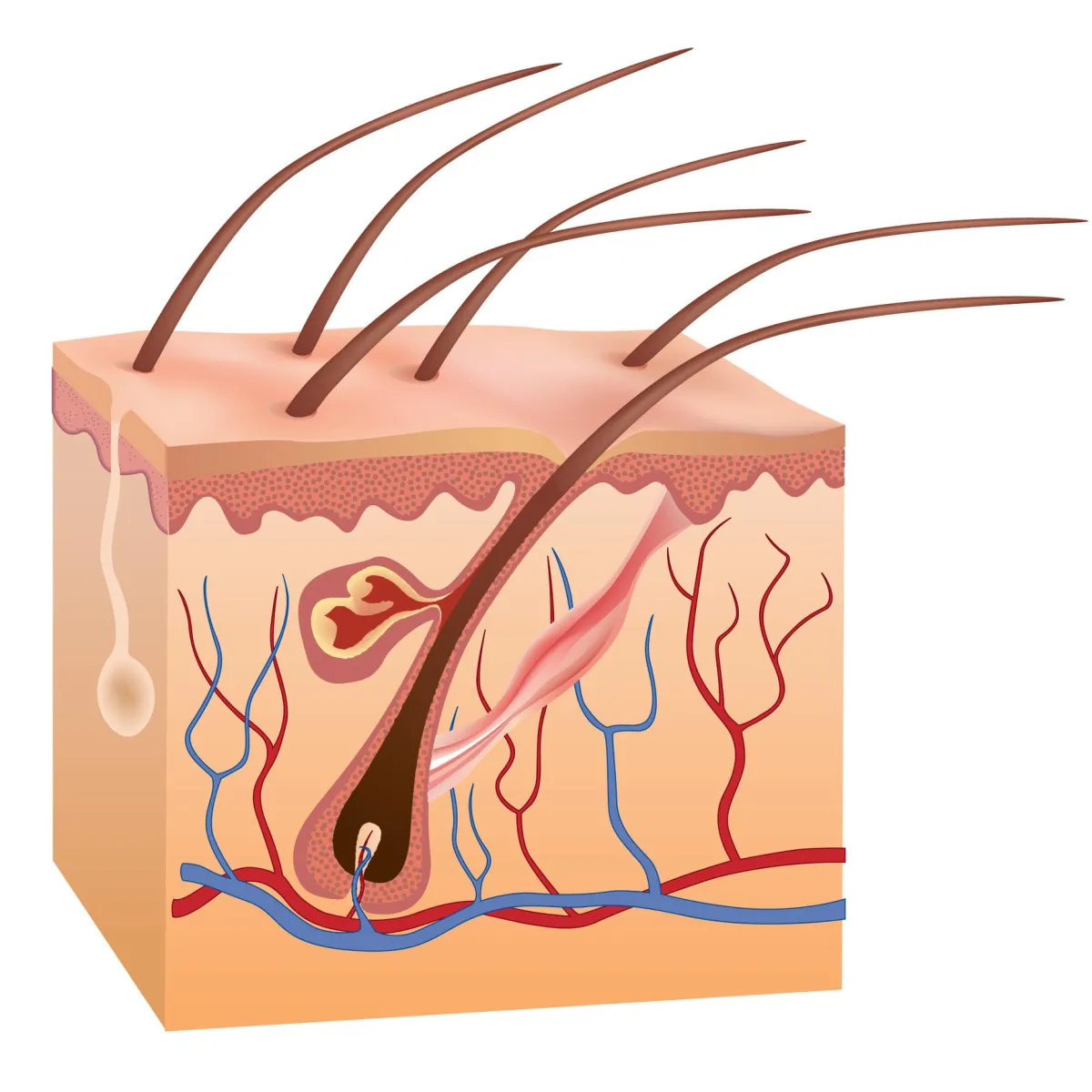
Alopecia Areata FAQ
What is Alopecia Areata, and how is it different from other types of hair loss?
Alopecia Areata (AA) is an autoimmune condition where the immune system mistakenly attacks the hair follicles, leading to sudden hair loss—often in round, patchy areas. Unlike pattern hair loss or shedding due to stress or nutrition, AA is driven by internal immune responses. It can occur at any age and may also affect eyebrows, lashes, and body hair. On The Hair Wire, we explore not just the “what” but the why—looking at lifestyle, genetics, and epigenetic factors that may influence autoimmune conditions.
What triggers Alopecia Areata?
Triggers can vary but often include emotional stress, illness, trauma, and environmental factors. While the root cause is autoimmune, emerging research in epigenetics suggests that lifestyle, diet, and stress management can either calm or exacerbate the immune response. Understanding these patterns is key to creating a personalized hair wellness strategy—which we specialize in unpacking through The Hair Wire’s educational approach.
Is Alopecia Areata permanent? Will my hair grow back?
In many cases, yes, the hair can regrow, but it’s often unpredictable. Some individuals experience full regrowth, while others may have recurring or persistent patches. Regrowth may also appear white or finer at first. We encourage clients and professionals alike to look beyond quick fixes and instead understand the deeper cyclical nature of autoimmune conditions—and how that interplays with the hair growth cycle.
Is there a cure for Alopecia Areata?
There’s currently no definitive cure, but several treatments—ranging from corticosteroid injections and topical agents to nutritional therapy and stress modulation—can support regrowth or remission. At The Hair Wire, we advocate for an integrative approach, blending clinical insight with supportive lifestyle strategies to manage flare-ups holistically.
Can diet and lifestyle affect Alopecia Areata?
Absolutely. While AA is autoimmune in origin, studies in nutrigenomics and epigenetics show that diet, inflammation, and stress levels can influence gene expression and immune regulation. Anti-inflammatory diets, gut health, and targeted nutrient support may help balance the body. It’s why we often say, what’s showing up on your scalp may be echoing from your lifestyle.
How do I emotionally cope with the impact of AA?
Hair loss can deeply affect self-image and confidence. On The Hair Wire, we believe acknowledging the emotional side of hair loss is just as vital as addressing the physical one. We encourage mindful support, community connection, and exploring rituals that bring comfort and identity back—because hair is more than just strands; it’s a part of your story.
Is Alopecia Areata contagious or related to poor hygiene?
No, AA is not contagious, nor is it caused by poor hair care or hygiene. It’s an immune response, not a result of external cleanliness. That said, scalp health is still important—a balanced microbiome and clean follicular environment can support healthy regrowth and reduce secondary inflammation.
Are children affected by Alopecia Areata too?
Yes, AA can begin in childhood or adolescence, often triggered by stress, illness, or even food sensitivities. Early intervention, gentle education, and support for both child and family are key. We offer resources through The Hair Wire to help navigate these early stages with both scientific clarity and emotional care.
Can hair care products worsen Alopecia Areata?
Most products won’t directly cause AA, but irritating ingredients—especially fragrances, sulfates, or alcohol—can inflame already sensitive scalps. We suggest using gentle, dermatologist- or trichologist-recommended products, with a focus on soothing the skin and reducing unnecessary immune triggers.
Where can I find reliable support or connect with professionals about Alopecia Areata?
You’re already in the right place. The Hair Wire is home to a community of certified trichologists, scalp specialists, and educators who bridge clinical expertise with real-world support. Whether you're a professional wanting to deepen your knowledge or someone on a personal hair journey, we’re here to guide you—through science, story, and self-awareness.

We’re more than hair. We’re a community, an education platform and a movement.
Our mission is to raise the standard — reigniting the heart of this industry with integrity, purpose, and connection. We’re also committed to bridging the gap between cosmetology, dermatology, and general practice, creating a more collaborative and informed approach to hair and scalp health.
ABOUT
The Hair Wire is a trusted resource created by trichologists, for anyone seeking clarity around hair and scalp health. With clinically backed information, we simplify complex hair loss conditions and offer professional insight, education, and solutions—one strand at a time.
DISCLAIMER
The content on The Hair Wire is intended for educational and informational purposes only. It is not a substitute for medical advice, diagnosis, or treatment. While our material is guided by professional experience and clinical trichology, we encourage individuals to consult with their own healthcare or wellness providers when making personal health decisions. The Hair Wire offers professional insights, not medical directives.
PATRON ACCESS
PRO' ACCESS
© Copyright 2025. The Hair Wire / Facutly of Trichology. All rights reserved.
